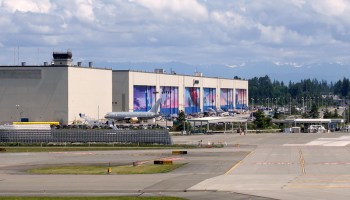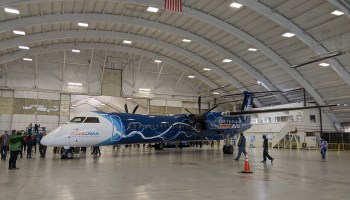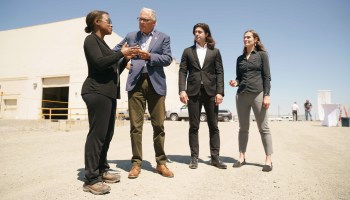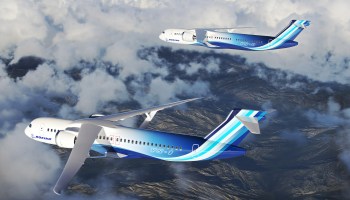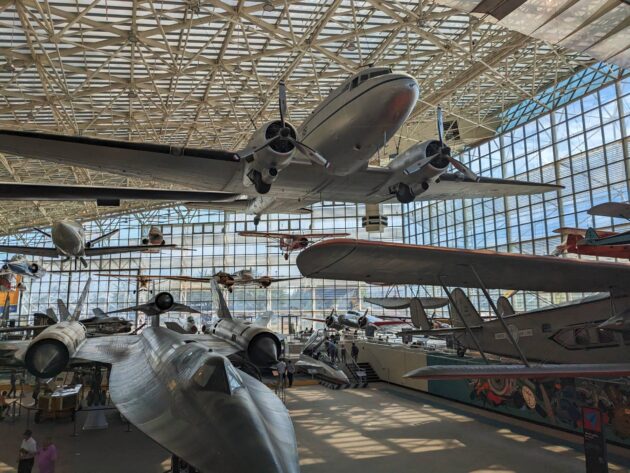
Aviation is responsible for 2.3% of U.S. greenhouse gas emissions — a number that’s almost certain to grow as air travel increases while ground transportation and the power grid cut their fossil fuel use.
“We’re putting more and more carbon in the atmosphere and things are warming up. We have to take some bold action,” said Richard Wahls, manager of NASA’s Sustainable Flight National Partnership.
Those actions include nearer-term fixes, such as massively scaling up the production of sustainable aviation fuel or SAF, which can replace the jet fuel used in existing aircraft. Other approaches will require more significant investments in new aircraft and infrastructure, such as reimagining the design of jets to boost their efficiency and switching to airplanes powered by batteries or clean-burning hydrogen fuel.
All of the approaches come with costs and tradeoffs and will be ready to roll out on different timelines. In order to meet international goals to slash carbon emissions to zero by 2050, all are on the table.
“We’re going to need to be able to produce aircraft faster, and they’re going to need to be better.”
Richard Wahls, manager of NASA’s Sustainable Flight National Partnership
On Thursday, Wahls and other national sustainable aviation experts from universities, government agencies and industry gathered at Seattle’s Museum of Flight for a symposium convened by the Washington State Academy of Sciences, a nonprofit comprised of prestigious science and engineering experts who help inform public policy.
Set against the backdrop of the museum’s notable aircraft from history, the presenters laid out the numerous strategies being pursued in the U.S. to cut carbon emissions from flight. They made clear the magnitude of the challenge of reshaping the sector.
There were nearly 9 million commercial flights in the U.S. in 2022. Worldwide, there are about 25,000 airline planes flying today. Manufacturers Boeing and Airbus project the need for 40,000 new airplanes over the next 20 years, some replacing old aircraft and many that will be added to the existing count.
“That’s 2,000 per year, and we’ve never done that in history, produce that many globally,” Wahls said. “So we’re going to need to be able to produce aircraft faster, and they’re going to need to be better.”
Given how long it takes to develop, certify and build aircraft, he added, the world has only a couple of chances to get right the new, more climate friendly models.
Stephen Tibbitts, an event attendee and CEO of Tacoma’s Zeva Aero, raised the issue of re-configuring flight routes away from the current hub-and-spoke design that favors national airlines and larger planes. Changing that approach could allow for shorter, direct flights using planes with alternate fuels — and would benefit a company like his, which is developing battery-powered aircraft.
“There are companies commercially looking at doing regional airlines, and probably trying to move that passenger from the giant hub-and-spoke model to a regional point-to-point model where battery technology is viable today,” Tibbitts said, addressing one of the expert panels.
Washington state has researchers and companies working on a variety of the solutions discussed at the event. That includes:
- Twelve, a California-based sustainable aviation fuel startup, broke ground in July in Eastern Washington on the state’s first production facility. This spring, rival company SkyNRG announced its plans to also build a fuel production facility in the state.
- State lawmakers this year approved funding to create a sustainable aviation fuel R&D center in Everett.
- Boeing and NASA are collaborating with Seattle-based Alaska Airlines and four other major airlines on the Sustainable Flight Demonstrator project, a $1.1 billion project to test an innovative aircraft design to cut fuel use. The first flight is planned for 2028.
- ZeroAvia, a hydrogen-powered aviation startup, is growing its research and development capabilities at its facility at Everett’s Paine Field. Universal Hydrogen, a California company, is partnering with Seattle-based AeroTEC and Everett-based MagniX to develop its aircraft and conducted a test flight of its Lightning McClean plane in Moses Lake, Wash.
- On the battery front, startup Eviation conducted a test flight of its all-electric Alice airplane in Moses Lake in September 2022, and Zeva Aero, a personal aviation startup who hopes to certify its battery-powered aircraft in 2026.
Thursday’s event included panelists and presenters from Boeing, Washington State University, University of Washington, Washington Department of Commerce, and state lawmakers, as well as experts from the Federal Aviation Administration and other research institutions nationally.
